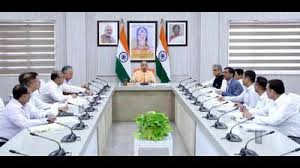In a significant move aimed at modernizing and strengthening the environmental governance structure in Uttar Pradesh, Chief Minister Yogi Adityanath has directed a comprehensive restructuring of the Uttar Pradesh Pollution Control Board (UPPCB).
The Chief Minister’s instructions came during a high-level review meeting held on Wednesday, where he emphasized the need to realign and upgrade the board’s functioning to meet the growing environmental challenges of the 21st century.
The Chief Minister pointed out that the mandate and responsibilities of the UPPCB have expanded considerably since its establishment in 1995.
Over the past three decades, rapid industrial growth, urbanization, and evolving patterns of waste generation have placed an increased burden on the board, demanding both structural and strategic reforms to ensure environmental protection and sustainable development across the state.
As part of the restructuring plan, Adityanath underscored the importance of enhancing the board’s physical presence at the local level.
He specifically directed the establishment of dedicated district-level offices to improve accessibility and operational efficiency.
Additionally, he proposed that the board’s regional offices be restructured in line with Uttar Pradesh’s 18 administrative divisions, ensuring streamlined management and better coordination with district authorities.
Recognizing the unique environmental demands of industrial clusters and heavily industrialized zones, the Chief Minister recommended that multiple regional offices could be set up within the same division where required.
This, he explained, would allow the board to handle the increasing workload more effectively and facilitate quicker response times for inspections, regulatory clearances, and public grievance resolution.
The Chief Minister also stressed the need for the UPPCB to equip itself with specialized capabilities to tackle modern waste management challenges.
He instructed the creation of dedicated cells for different waste categories, including solid waste, liquid waste, hazardous waste, electronic waste, and biomedical waste.
Each specialized cell would focus on creating targeted strategies, improving monitoring mechanisms, and ensuring that all waste disposal practices align with national and international environmental standards.
In addition to waste management, the Chief Minister advocated for the formation of dedicated units within the board to focus on research and development (R&D), environmental awareness campaigns, and the publication of educational materials.
He also called for the adoption of modern technologies, including the use of Information Technology and Artificial Intelligence, to improve the board’s efficiency and analytical capabilities.
“These proactive steps will significantly enhance the overall effectiveness, responsiveness, and accountability of the Uttar Pradesh Pollution Control Board,” Adityanath remarked during the meeting, expressing confidence that such reforms would pave the way for better environmental stewardship in the state.
Another key focus area highlighted by the Chief Minister was the need to streamline and expedite the process of issuing No Objection Certificates (NOCs) — specifically the Consent to Establish (CTE) and Consent to Operate (CTO) — which industries are required to obtain from the board.
At present, the approval timeline for these applications varies depending on the risk category of the industry: up to 120 days for red, orange, and green category applications.
Adityanath issued clear instructions to drastically reduce this timeline, setting ambitious new targets. Under the revised framework, red-category applications should be processed within 40 days, orange-category applications within 25 days, and green-category applications within just 10 days.
He directed the concerned officials to immediately begin developing the necessary systems and workflows to meet these timelines, ensuring that industrial growth is not hindered by bureaucratic delays while maintaining strong environmental safeguards.
The Chief Minister also took note of the vacant positions within the UPPCB and urged the department to expedite the recruitment process.
He stressed the importance of attracting technically skilled and qualified candidates, suggesting that the board should prioritize hiring bright young professionals from reputed institutions, including the Indian Institutes of Technology (IITs).
To attract such talent, he encouraged offering competitive and attractive salary packages while ensuring that all appointments are carried out transparently and that established rules and procedures are followed.
Lastly, the Chief Minister addressed the issue of NOC and consent fees, observing that no revisions have been made to the existing fee structure since 2008.
He recommended that the board undertake a thorough review of the fee framework and implement any necessary updates to reflect the current economic and operational landscape.
Adityanath concluded the meeting by reiterating his commitment to ensuring that Uttar Pradesh not only meets its environmental protection goals but also becomes a model state for efficient and forward-looking governance in the area of pollution control and ecological conservation.

